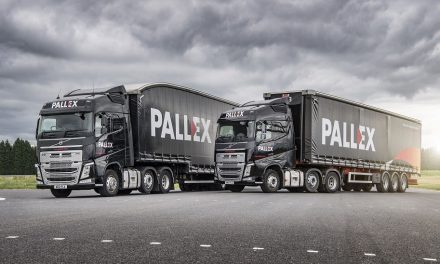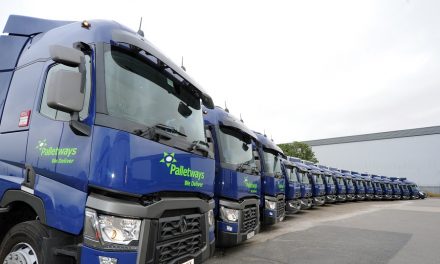
A combined force to be reckoned with
While individual hauliers seem to struggle harder each year to build their business and earn a respectable margin, those who have banded together into pallet networks have never looked back.
The main UK networks, of which six or seven now claim truly national coverage, have been reporting growth levels of 40% and more. The only thing appearing to hold them back has been the limits to their hub capacity and desire to add ever more members.
Now, the market leaders are looking to differentiate their services and establish a clearer individual identity.
Lichfield-based Palletways is predicting a turnover of £60m (t86m) this year, but MD Julian Maturi says: "It's getting tougher and the market is getting more mature.
The customer will become more discerning and the quality companies will be the ones least affected. As the slowdown comes, the market will divide into the cheap and cheerful and those who can do a quality job." There are two schools:
co-operatives, in which members have a stake in the hub, and simple membership networks.
Proponents of the latter model claim quality is assured because members have to uphold the reputation of the network day in, day out – they have to deliver, or they're out.
"If you break the rules or don't perform, we must ask you to leave because quality is all about continuous improvement, and we can't afford to have members who are not improving, " Maturi says.
Mick Scarlett, chief executive of member-owned Palletforce, counters that his structure, too, has "paid dividends" in terms of quality levels.
Palletforce has a comprehensive membership agreement, equivalent to other networks' rulebook, which is rigorously applied, Scarlett says. And because members have invested their own money in the company – from £10,000 up to £50,000 (t14,500-t72,000) – they have a vested interest in developing the Palletforce brand, he adds.
Pall-Ex argues the case for central ownership, emphasising that it does much more than just running a hub and enforcing discipline. Its members benefit from group insurance and procurement schemes, and the network also offers sales and accountancy services.
Clear though these distinctions may be from the inside, developing greater brand awareness is a challenge facing all networks as the market matures. A survey of 300 service users, published by Triangle Management Services in August, found a low level of awareness.
"There are serious implications here for the pallet networks, " commented Robin Parr-Davies, Triangle's head of research and consultancy.
"Since most of these specialist networks are licensee-based, low customer awareness for the national network brand leaves individual local hauliers the freedom to change networks without much risk to their revenue." Palletways is facing up to this risk by targeting national customers, which is helping its members derive revenues from a market traditionally closed to them.
"We're focusing on national opportunities, so there's no conflict in target client lists, " Maturi says. "Recent business wins include Castrol, WD-40, Carlsberg-Tetley and Boots.
Very few of our members would have the clout and muscle to go to Boots and say, we're able to do your Christmas deliveries." Pall-Ex also has national customers in its sights.
Retailers such as B&Q, Debenhams and Allders are suffering bottlenecks of goods in their distribution centres which can be alleviated through consolidation, says Alan Cramley, sales and marketing director. He has identified an opportunity for pallet networks to step in, consolidate incoming goods at their own hubs and taking them into DCs as single loads.
One advantage of the nonmembership business model is that the network can concentrate on developing operations at the hub.
Palletways has developed a centralised stockholding facility under the Stargate Logistics brand at its Lichfield hub. "Stargate has been an unmitigated success and it is the focus for a lot of Palletways' growth and development, " Maturi says.
Twinning the pick-and-pack operation with the pallet network next door benefits customers because it gives them a 9pm cut-off for orders while still ensuring next-day delivery, he says. "We launched it less than a year ago as a concept and we've been overwhelmed by the response so far." Stargate took a lot of the overflow for retailer Matalan last Christmas and Maturi says it is set to do the same this year. Other customers include Black & Decker and WD-40.
Pall-Ex is also offering warehousing and storage. It is looking into destuffing containers from overseas and palletising the goods for onward distribution over the network.
Continental Europe is set to be another battleground for the networks, and each has a different strategy.
Palletways chose virgin pallet network territory in Italy for its first European venture, back in February 2002, and decided to export wholesale its UK structure.
"What we've done in Italy is to replicate Palletways UK, which is a completely different model to what anybody else has done, or is thinking of doing, in Europe, " Maturi says.
"We've got 40 members in Italy and we are doing well over 1,000 pallets every night.
If the Italian business were in the UK league, it would be seventh or eighth." The business is already nine months ahead of schedule and it is already about to outgrow its premises, he adds.
The company will not offer a UK to Italy trunking service until it is sure that the Italian end can consistently offer the service quality its UK customers expect, he says.
Next step for the company is to develop a parallel network in the Benelux countries, to be followed in due course by Spain, France and Germany.
Pall-Ex is taking a different approach to European expansion by forming alliances with members of networks in other countries. "Germany already has a lot of networks, " Cramley says. "We have formed an alliance with one member, giving us complete coverage from day one." Pall-Ex operations have also been set up in Scandinavia, Ireland and Iberia, and the company is talking to a number of companies in Belgium and the Netherlands about launching in Benelux.
These are each supported by trunking operations, unlike the Palletways model, however, and the main problem Pall-Ex has encountered has been the imbalance in trade with the UK. At the moment, Pall-Ex has 100 pallets coming from Germany for every 62 going out, Cramley says.
In the longer term, Pall-Ex is actively examining the feasibility of putting freight onto trains for moving pallets into Scotland and continental Europe.
Palletforce's Scarlett is taking a careful approach to European expansion by taking advantage of daily continental services already being run by its individual members. Nidd Transport, based in Ripon, Yorkshire, does the trunk to Spain, and Redhead International, based in Bradford, serves France and the Netherlands. Shortly after going live in September 2000, the network also formed a strategic alliance with Belgian transport and logistics company Gillemot, a subsidiary of Giraud.
Although growth rates in the UK will inevitably slow, there is still plenty of opportunity for the major networks.
"There is still growth in the market and we are positioned to take a disproportionate amount of it as market leader, " Palletways' Maturi says. "A lot of our competitors have reached a stage where they are logjammed: they can't run faster than the tide." He predicts that Palletways will have a turnover of £100m in two to three years, but is reluctant to put a figure on the eventual size of the business – although he does not envisage the size of the network exceeding 120 members.
The future will be about demonstrable quality improvements, Maturi says.
"For example, we can track and trace live on the internet, so major customers can view the progress of their pallet, " he says.
Once the networks have established a reputation for quality and integrity with major customers, he believes they will be able to offer even more sophisticated logistics solutions.
"If there's ever a company that's well positioned to offer a practical solution to factory gate pricing, it's us, " Maturi says. "We can do it, the IT can do it and I think it's only a matter of time before we end up managing the process for one of the major supermarket chains. Factory gate pricing is something the supermarkets want but no one has come up with the solution yet." Pall-Ex's Cramley agrees there is a bright future for pallet networks. The Working Time Directive supports the network idea and just-in-time manufacturing will lead to organisations holding less stock and requiring even more frequent deliveries, he says. n
Posted: 20/10/2003













